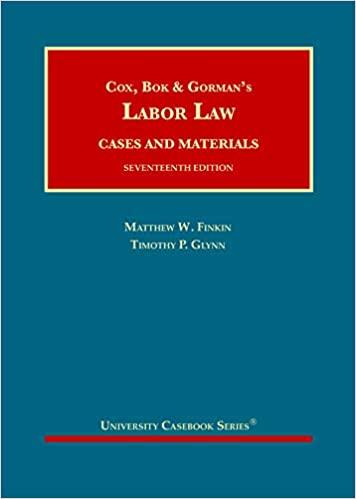Question
1.Members of the Westboro Baptist Church claim that the First Amendment protects them from IIED lawsuits since they are expressing a political opinion by picketing
1.Members of the Westboro Baptist Church claim that the First Amendment protects them from IIED lawsuits since they are expressing a political opinion by picketing at soldier funerals. The pickets take place on public property and in compliance with local picketing laws. If the plaintiffs win the case, the church is unlikely to have the money to satisfy the judgment and may seek bankruptcy. Do you believe that this conduct is extreme and outrageous enough to constitute a tort? Why or why not?
In 1983,Hustler magazine (owned by publisher Larry Flynt) ran a print advertisement patterned after a Campari liquor ad campaign. The real ad campaign featured celebrities "talking about their first time" in a question-and-answer interview format, slowly revealing that the celebrities were speaking about their first time drinking Campari. The Hustler advertisement featured fundamentalist preacher Jerry Falwell, who was running a campaign against pornography at the time, and insinuated that Falwell had lost his virginity to his mother. Falwell sued Flynt and the magazine, and a jury awarded Falwell $150,000 in damages. The Supreme Court overturned the verdict on appeal on grounds of the First Amendment, holding that as a public figure, Falwell had to endure the advertisement. Do you believe that celebrities and public figures should have a harder time winning IIED lawsuits? Why or why not?
2. Do you believe that an "identifying characteristic" should be protected by the tort of misappropriation, or do you believe that society has gone too far in recognizing property rights? A First Amendment exception exists for comedians who engage in satire and comedy (think of Saturday Night Live's impersonations of the Trump-Clinton debates during the 2016 presidential campaign, for example). Does it make sense to you that comedians can make money through misappropriation, but other businesses cannot?
3. Look at the advertisement featured in"Is a Single Name a Likeness or Identifying Characteristic?". Do you think that the ad is referring to Lindsay Lohan? Has the name "Lindsay" become so linked to Lohan that companies run the risk of being sued if they use the name Lindsay in advertisements? What if the advertisement had used a name like "Oprah" or "Cher"?
4. The public nuisance tort has long been used to address behavior that causes injury to a local community rather than individual victims. In one of the earliest cases involving public nuisance, for example, Missouri sued Chicago for discharging sewage into the Mississippi River, polluting the water as to render it unfit for drinking and breeding typhoid and other diseases. In 2011, a group of plaintiffs comprising eight states and the City of New York sued the American Electric Power Company and other power companies under a theory of public nuisance, seeking to limit the defendant's emissions of greenhouse gases that the plaintiffs allege lead to global warming. The Supreme Court dismissed the lawsuit, reasoning that the Clean Air Act, which gives the EPA the authority to regulate greenhouse gases, displaced the federal common law on public nuisance. Do you agree that states suffering harm from global warming should not be permitted to use the public nuisance tort to abate that harm? What if the EPA is unwilling or unable to act to protect the states in question?
5. Looking at the 2011 case with Bates v. Dow Agrosciences LLC, which had somewhat the opposite effect. In Bates, the U.S. Supreme Court held that the Federal Insecticide, Fungicide, and Rodenticide Act (FIFRA) did not pre-empt claims brought under state common law doctrines, including strict product liability and breach of warranty. The court cited, among other things, the "history [of the use of common law claims, which emphasize[...] the importance of providing an incentive to manufacturers to use the utmost care in the business of distributing inherently dangerous items."
6. Defamation law only protects the living. Some legal commentators believe that defamation should also protect the dead. for example, law professor Jonathan Turley's opinion in the Washington Post here: http://www.washingtonpost.com/wp-dyn/content/article/2006/09/15/AR2006091500999_pf.html. Turley points out examples of how the dead have been defamed, such as the character of William Murdoch in the 1997 movie Titanic, where he was portrayed as a murderous nut. In reality, survivors reported he took heroic actions to save passengers. Do you believe defamation should be extended to protect the dead as well as the living?
Step by Step Solution
There are 3 Steps involved in it
Step: 1

Get Instant Access to Expert-Tailored Solutions
See step-by-step solutions with expert insights and AI powered tools for academic success
Step: 2

Step: 3

Ace Your Homework with AI
Get the answers you need in no time with our AI-driven, step-by-step assistance
Get Started


